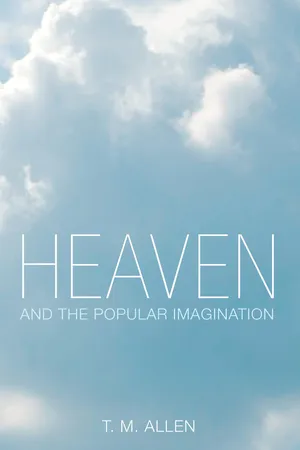![]()
Part I
Theologically Engaging Popular Culture
![]()
1
Revelation, the Spirit, and Culture
In the process of unfolding a methodology, a critical first step is to offer a theology of revelation, connecting several strands, while concentrating on areas of pneumatology. Any project that includes elements of philosophical theology should ask why one must look beyond the scriptures to provide a hermeneutic of doctrine that takes seriously the Holy Spirit’s continued action in the world. Considering heaven, as a reminder of God’s presence in the world, where he seeks to disclose his action to finite creatures, invariably leads to the question of how one is to understand this reality.
Revelation Beyond Scripture
In what follows, I offer a short preface by setting forth some preliminary thoughts concerning a theology of revelation. In doing so, I hope to shed light on some of the influences on my work, as well as to contextualize my presuppositions in order to move forward in theologically engaging popular culture.
The concept of revelation has to do with the unveiling of divine truth; not just any truth, but truth that is revealed by one who is infinite, not finite. More specifically, the presupposition that underlies the current project is concerned with truth of the triune God: Father, Son, and Holy Spirit. I emphasize this trinitarian focus early on, especially for those who become anxious in theology-and-culture dialogues out of concern that one’s pneumatology will become characterized by “semantic chaos.” Stated most aptly by Farrer:
The following scholars have made important contributions to the development of relating the imagination and revelation that are particularly pertinent for this study. First, David Brown insists that we should look at the world with the understanding that God is presently active; and that, in perceiving, one must pay close attention to “the stories and images that give religious belief its shape and vitality.” Secondly, Douglas Hedley has sought to develop Farrer’s work on the imagination and revelation. Where “Farrer liked to speak of double agency—certain acts which are at once authentically human and yet the channels of divine influence,” Hedley wants “to speak of the anagogic imagination to designate such a reciprocal relation: the human construction of symbols of God which at the same time constitute divine epiphany.” In a similar trajectory, this book offers a renewed interest in Farrer’s and these others’ attempts to “produce an account of the imagination which culminates in a theory of inspired images which is based on the doctrine that man is made in the image of God.”
Images are shaped within specific cultural contexts and Wolfhart Pannenberg’s importance for this study emerges from his insistence that we pay closer attention to the historical drama of God’s action, not just for contextual reasons, but also for understanding the public nature of revelation. For Pannenberg, “the revelation of the biblical God is demonstrated before all eyes for the benefit of all people. It is not a secret knowledge available to the few.” He admits that his argument raises questions concerning God’s self-revelation and issues of perceptibility. Pannenberg shows how the biblical-historical thought is concerned with “indirect revelation on the basis of God’s activity in history.” Pannenberg is after a theology of ‘word’ and ‘deed’, seeking to refute an overly anthropomorphic understanding of revelation on the one hand, and a telepathic type of revelatory theory that bypasses the imagination on the other. He shows the difficulty in reconciling the variety of ways the scriptures mention revelatory experiences, and argues that indirection takes into account “an all-embracing event of self-revelation to which each of them [revelatory experiences] makes its own specific contribution. Along these lines there need be no rivalry between the OT and the NT witness to revelation.” Pannenberg is more entrenched in theological debates surrounding issues of scripture, however, and does not address sufficiently, as Farrer and Brown seek to do, how the indirection, or better yet, the mediation of revelation is part of our created situation, and the important role of imagination in the reception process. James K. A. Smith has criticized Pannenberg for his “eschatological immediacy model” that implies “interpretation is a state of affairs from which humanity must be redeemed.” Smith is correct, in my view, that “hope of overcoming and escaping human finitude” is not the most promising way forward and limits our understanding of the imagination.
In a similar way, mediation does not take away from the personal relatability of God, neither does it produce a soft agnosticism communicating a theoretical availability of revelation, yet without allowing experiential access of revelation. On the contrary, “indirecti...
